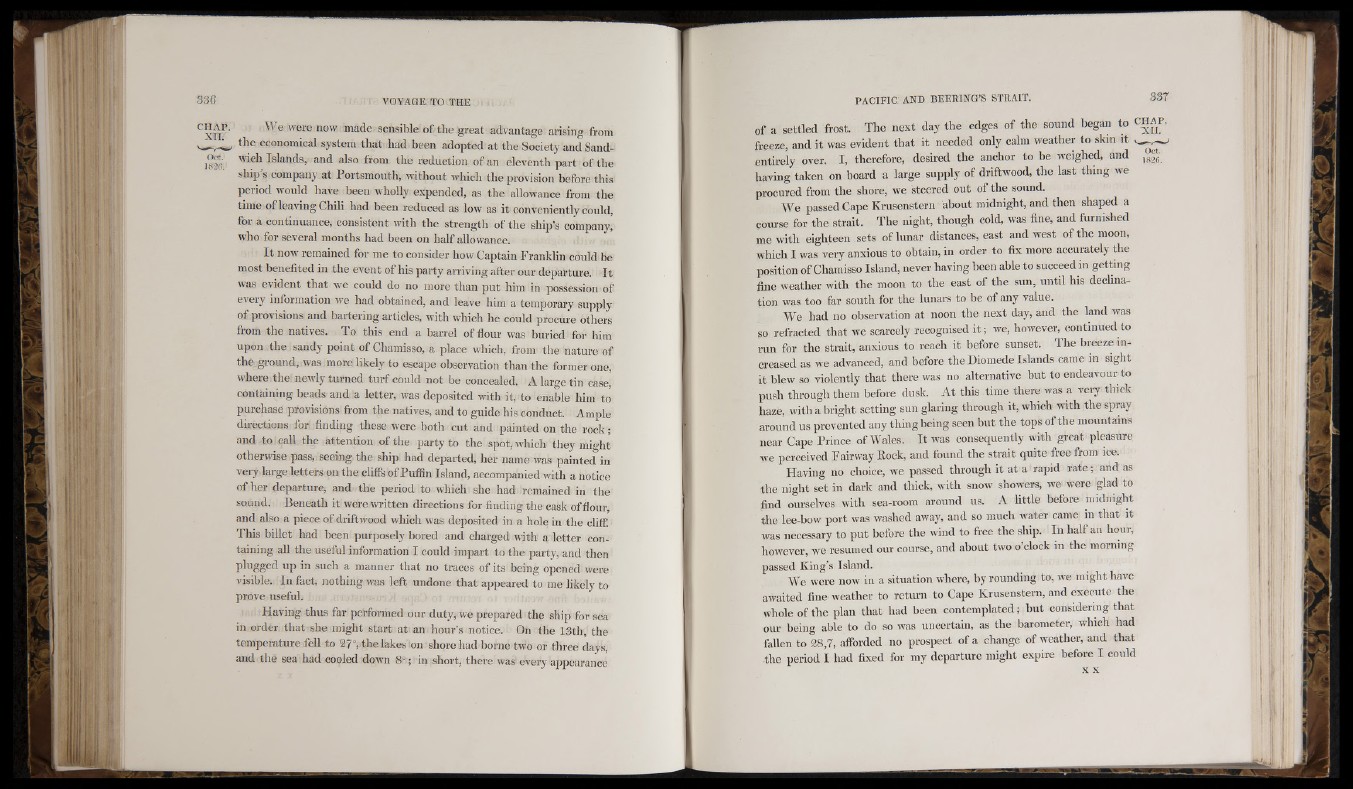
\ \ e were now made sensible of the great advantage arising from
, the economical system that had been adopted at the Society and Sandwich
Islands, and also from the reduction of an eleventh part of the
ship’s company at Portsmouth, without which the provision before this
period would have been wholly expended, as the allowance from the
time of leaving Chili had been reduced as low as it conveniently could,
for a continuance, consistent with the strength of the ship’s company,
who for several months had been on half allowance.
It now remained for me to consider how Captain Franklin could be
most benefited in the event of his party arriving after our departure. It
was evident that we could do no more than put him in possession of
every information we had obtained, and leave him a temporary supply
of provisions and bartering articles, with which he could procure others
from the natives. To this end a barrel of flour was buried for him
upon the sandy point of Chamisso, a place which, from the nature of
the ground, was more likely to escape observation than the former one,
where the newly turned turf could not be concealed. A large tin case,
containing beads and a letter, was deposited with it, to enable him to
purchase provisions from the natives, and to guide his conduct. Ample
directions for finding these were both cut and painted on the rock;
and to call the attention of the party to the spot, which they might
otherwise pass, seeing the ship had departed, her name was painted in
very large letters on the cliffs of ruffin Island, accompanied with a notice
of her departure, and the period to which she had remained in the
sound. Beneath it were written directions for finding the cask of flour,
and also a piece of driftwood which was deposited in a hole in the cliff:
This billet had been purposely bored and charged with a letter containing
all the useful information I could impart to the party, and then
plugged up in such a manner that no traces of its being opened were
visible. In fact, nothing was left undone that appeared to me likely to
prove useful.
Having thus far performed our duty, we prepared the ship for sea
in order that she might start at an hour’s notice. On the 18th, the
temperature fell to 27", the lakes on shore had borne two or three days,
and the sea had cooled down 8“; in short, there was every appearance
of a settled frost. The next day the edges of the sound began to CHAP.
freeze, and it was evident that it needed only calm weather to skm it I l t - C i C j t l l lU. 11/ v»a,o v-» 1/ ,/ V I I
entirely over. I, therefore, desired the anchor to be weighed, and
having taken on board a large supply of driftwood, the last thing we
procured from the shore, we steered out of the sound.
YVe passed Cape Krusenstern about midnight, and then shaped a
course for the strait. The night, though cold, was fine, and furnished
me with eighteen sets of lunar distances, east and west of the moon,
which I was very anxious to obtain, in order to fix more accurately the
position of Chamisso Island, never having been able to succeed in getting
fine weather with the moon to the east of the sun, until his declina-
i tion was too far south for the lunars to be of any value.
YVe had no observation at noon the next day, and the land was
so refracted that we scarcely recognised i t ; we, however, continued to
run for the strait, anxious to reach it before sunset. The breeze increased
as we advanced, and before the Diomede Islands came in sight
it blew so violently that there was no alternative but to endeavour to
push through them before dusk. At this time there was a very thick
haze, with a bright setting sun glaring through it, which with the spray
around us prevented any thing being seen but the tops of the mountains
near Cape Prince of YVales. It was consequently with great pleasure
we perceived Fairway Book, and found the strait quite free from ice.
Having no choice, we passed through it at a rapid rate; and as
the night set in dark and thick, with snow showers, we were glad to
find ourselves with sea-room around us. A little before midnight
the lee-bow port was washed away, and so much water came in that it
was necessary to put before the wind to free the ship. In half an hour,
however, we resumed our course, and about two o'clock in the morning
passed King’s Island.
We were now in a situation where, hy rounding to, we might have
awaited fine weather to return to Cape Krusenstern, and execute the
whole of the plan that had been contemplated; but considering that
our being able to do so was uncertain, as the barometer, which had
fallen to 28,7, afforded no prospect of a change of weather, and that
the period I had fixed for my departure might expire before I could
X X
1826.